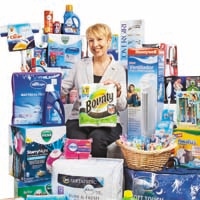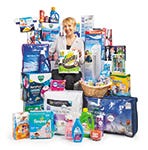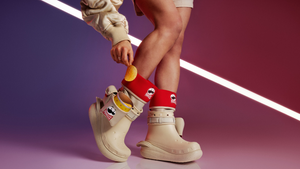Procter & Gamble boasts a portfolio of 300 brands and ranks as one of the top licensors in the world with an unlimited potential for future growth.
April 6, 2018

Procter & Gamble boasts a portfolio of 300 brands and ranks as one of the top licensors in the world with an unlimited potential for future growth.
|
Gayle Jones, global head of licensing, Procter & Gamble |
With a corporate focus on innovation, brand building and a keen understanding of consumers, Procter & Gamble has applied its immense market knowledge and research to create a powerful business in licensing that leverages its inherent strengths as a consumer products goods leader.
While Procter & Gamble is not a new player in licensing–its first initiatives date back to the mid-1980s when it acquired Vidal Sassoon–the company has grown consistently and conservatively over the past decade, extending its initiatives to 14 of its 26 billion dollar brands and partnering with Beanstalk, one of the world's leading licensing agencies.
The billion dollar brands that have licensing programs include such well-known names as Tide, Febreze, Mr. Clean, Vicks and Braun.
Procter & Gamble's approach to licensing closely mirrors its corporate philosophy and strategy, meaning that innovative products that improve consumers' lives are the driving factor.
|
Lisa Reiner, managing director, Europe and Asia Pacific, Beanstalk |
"Licensing can really help add to the offering consumers have and add to the connections consumers have with our brands," says Gayle Jones, global head of licensing, Procter & Gamble. "Our business units see licensing as a valuable business model, and it's still growing. Licensing expands our retail footprint especially in new channels–we can offer more choices to consumers based on brands they know and love.
"Consumers drive everything we do," adds Jones, who handles licensing in and out, saying that it's very interesting to be on both sides of the fence. "We don't do anything unless consumers believe it's the right thing to do."
There's little doubt that the licensing business model has worked, as Procter & Gamble ranked No. 21 among the world's largest licensors with an estimated $3 billion in retail sales of licensed merchandise, according to the exclusive annual Top 150 Global Licensors report published by License! Global.
"Ten years ago, licensing wasn't a really well-known business model throughout the company," recalls Jones. "But over time, we have been able to educate the business units on the values of licensing from the revenue to offering consumers what they want, extending awareness and keeping brands top of mind. There is always angst that brand equity is going to be harmed, but it truly doesn't have to be that way as long as you have the right processes, systems and governance in place and you choose the right partner. Then everybody wins."
One of P&G's most important partnerships in terms of its more recent growth in licensed products has been with Beanstalk, which was appointed to manage global licensing in June 2007.
"It has been exciting for Beanstalk to work with P&G to further expand this dynamic licensing program. With a portfolio of world-class brands, there are continuously new opportunities to bring innovation to the market and to reach even more consumers around the world through our relationships with best-in-class licensees. It is the seamless extension of brand equity from core to licensed products that has made P&G known as a gold-standard for corporate brand licensing," explains Lisa Reiner, managing director, Europe and Asia Pacific, Beanstalk.
"It's best to use experts in areas we are not experts in," says Jones. "Beanstalk really helped to expand P&G's licensing program to where it is today. They are not just an agency, but more a part of our group."
 In fact, Beanstalk now has two employees who work side-by-side with P&G in its Cincinnati, Ohio, headquarters.
In fact, Beanstalk now has two employees who work side-by-side with P&G in its Cincinnati, Ohio, headquarters.
"Beanstalk is an integral part of the trademark licensing team and completely aligned in pursuing licensing opportunities that will deliver innovation and value to the P&G consumer and that reinforce brand equity for P&G brands," says Reiner. "In addition, Beanstalk plays a critical support role as a link to the network of licensees."
Licensees are definitely held to a high standard of expertise and accountability.
"Do they have the go-to-market capabilities? Can they sell-in? Do they have the distribution? Are they real experts in their category? Do they have the quality and safety standards or the processes in place? Are they innovative?" asks Jones of potential licensees and partners.
Among some of P&G's largest and most notable licensing programs are:
Vicks is a leader in the health and wellness category. It launched in 1995 and now has more than 100 SKUs in 30 countries.
Mr. Clean now has dozens of cleaning products, and has the top-selling mops with its Magic Eraser line.
Febreze has a partnership with Bissell for carpet cleaning solutions and sprays and vacuum bags and filters.
Febreze has partnered with KAZ for Honeywell fans that allow consumers to use the "set and refresh" cartridge that P&G manufactures to create a light scent and take odors out of rooms.
The Fairy brand, in partnership with Nicols, is launching a line of dishwashing sponges and tools in Europe.
Braun has a partnership in place for watches and clocks. Licensing partner Zeon has incorporated the technical innovation, quality and modern, functional design concepts originated by Dieter Rams in the 1950s. Zeon's Braun watch and clock collection is sold in specialty boutiques and stores including the Museum of Modern Art.
The Vicks Starry Night humidifier created by KAZ is a cool-mist humidifier specifically for children that lights up and projects stars on the ceiling.
Springs Global launched last year the Febreze Sleep Serenity collection, which is basic bedding that offers the unique benefits of odor elimination and freshness in product categories such as pillows and mattress covers. This line created a new retail channel for P&G with placement in such retailers as Macy's and Bed, Bath and Beyond.
Over the next several years, Jones hopes to expand licensing to as many as 10 more brands in the P&G billion dollar portfolio, including perhaps Bounty and Gillette, as well as continue to expand internationally, possibly into China and India at some point. These factors clearly indicate that the company still has a huge upside growth potential in brand licensing.
"I would like all brands to play, but P&G has 300 brands and that's probably not going to happen. And not all brands are ripe for licensing anyway," says Jones. "I don't want in-out deals. I want long-term programs that are strategic for the business and grow with core brands."
On a personal note, Jones admits: "Licensing is one of the best experiences I have ever had. It's interesting and challenging. There is so much potential when you find the right partner. It's innovative, creative and collaborative and it's fun. I love licensing."
You May Also Like








